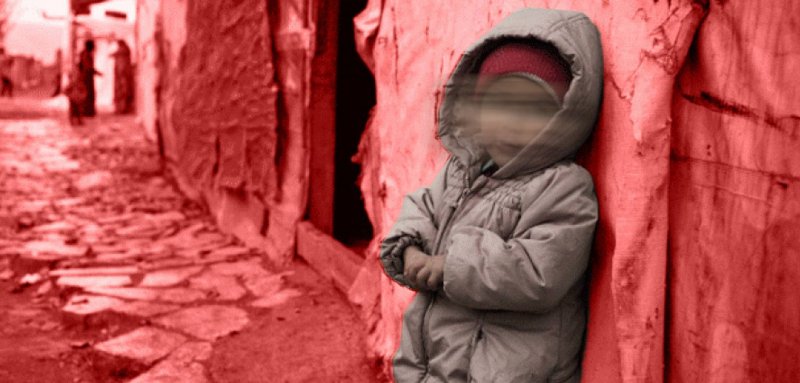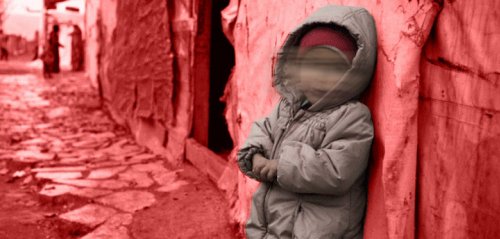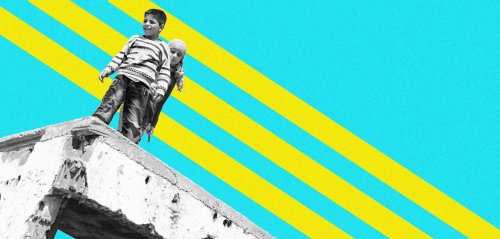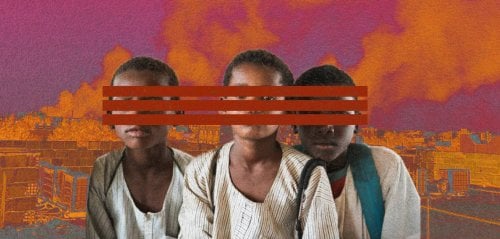Like other tragic incidents, the incident of a child's death at the hands of his classmates in the fifth grade, following a fight, passed by unnoticed a few months back. The media didn't even bother to cover the incident that took place at the Martyr Turmanin school in Idlib, northern Syria, on March 6th.
Doctor Ahmed Dahkoul, the child's uncle, recounts the details of the incident, saying, "Three children attacked our son while they were at school. The assault mainly targeted his upper abdomen, in addition to strangulation around the neck area, which led to a decrease in oxygen in the blood and resulted in his death, according to the forensic doctor. The child was then taken to a nearby hospital." He added that "the case was settled between the perpetrators' families and us after the release of the children and reviewing the criminal incident report, which confirmed that the whole thing was a fight between them."
This incident brings us back to another one that occurred earlier this year on January 6th, in areas under the control of the Assad regime. A student stabbed the principal of the Abdul Mu'in Qatarmiz elementary school in the Qusour neighborhood of Hama. Additionally, in September of the previous year, the principal of the Semneh school in the Salamiyah countryside was stabbed during his official working hours.
A student stabbed the principal of the Abdul Mu'in Qatarmiz elementary school in the Qusour neighborhood of Hama
Many incidents and official parties are absent
During the preparation of this report, my memory took me back two years to when I was in Afrin, northern Syria. At that time, my balcony overlooked an elementary school, and since my work required me to stay up late, it became a habit for me to wake up around noon, and as a result I witnessed incidents of violence and assault among young students while sipping my coffee on the balcony. I also witnessed firsthand how the teacher would pass by the altercation without taking any action or attempting to resolve the disputes or prevent the fights that would truly escalate two hours later or the next day, involving the students' parents, or relatives, and firearms.
Abu Khalil Dahla, a displaced person from the countryside of Damascus, only had one son among his five daughters. His son Khalil is currently studying in the eleventh grade in Idlib city and helps his father in his small shop after school. Dahla recalls a tragic incident that happened to him two years ago when his son's friends came to inform him that a group of students was assaulting Khalil. He says, "I left my shop and my customers and quickly rushed to the school. The scene was horrifying; a group of students, including young ones, taking turns beating my son. At first glance, I couldn't even recognize him; his clothes were extremely dirty, his face was red, and blood was flowing from his mouth."
He adds, "I tried to separate them, but what bothered me is that after the issue was resolved, my son got hit with a stick from a student who I don't think is above the sixth grade. That moment, I felt the weight of the world on my shoulders, especially as the bystanders watched and the students cheered on as if they were in a wrestling ring."
Dahla continues, "My son was affected mentally and physically. Despite some of the attackers' families coming to our house to apologize after the issue reached the administration, I preferred to transfer him to a private institute because schools are no longer a place for studying and acquiring knowledge, but rather an arena for violent confrontations, dangers, and showing-off."
Raseef22 contacted the Directorate of Education under the Interim Government in Idlib, but they refused to comment on the incident of the child's death that took place in March, and also declined to answer our questions regarding the growing phenomenon of violence among students.
The growing phenomenon of violence
It can be said that the phenomenon of violence among students, especially children, is an old phenomenon. There were many scenes of violence and conflicts prevalent before the Syrian revolution. However, violence, within a reality imposed by the conditions of a twelve-year-war, has become the dominant characteristic in societies and among different segments of society. It is a feature that is on the rise, with the continuously deteriorating living, social, and security conditions.
"A group of students and young children were taking turns hitting my son. At first glance, I couldn't even recognize him; his face was covered in blood. I was devastated, especially as bystanders watched and students cheered as if it was a wrestling ring"
Mahmoud al-Mohammad (pseudonym), a teacher in one of the schools in Idlib, insisted that his real name not be revealed when speaking to Raseef22 because the Ministry of Education prohibits teachers from talking to the media under penalty of liability. He says, "During my time in the education sector, I witnessed various forms of violence and have seen critical injuries happening to many students in their eyes and faces, as well as various fractures. In general, the administration does not take action when they observe violence except by expelling the student and summoning their guardian without addressing the problem from an educational or guidance perspective. The bigger problem is that many times the student's guardian needs guidance and counseling more than their child. I have seen many cases where the student's guardian attacked the administration with weapons due to a fight their child was involved in, without asking about the details of the case."
The war itself is inherently violent due to the scenes of killing, injury, horror, deprivation, poverty, and painful losses it contains. It primarily affects both the young and the old, who often find themselves surrounded by life battles within their family environment.
Al-Mohammad indicates that "a large number of children do not attend school on a regular basis. Many of them are required to work, some work after school in various professions and markets, and some look for scrap, cardboard, and wood to sell and meet their family's needs. This naturally leads to interaction with different social groups with different societal awareness and upbringing, in addition to the fact that these professions themselves require a certain level of violence, not to mention frequent displacement conditions that transfer the student to an unknown environment and a society that deals with him through confrontation."
A deteriorating education system
Today, the educational system suffers from serious gaps that can be seen on the ground. The educational curriculum has not changed or developed mechanisms for dealing with children and students in general, whether by parents or schools. Counseling and guidance measures are absent in schools, particularly the role of the school counselor, which has been almost completely neglected and replaced by other subjects that focus solely on religious aspects. This means that the school environment bears some responsibility for the spread of certain types of violence, especially given the limited space allocated to students and overcrowding in the school environment.
The educational curriculum in those areas has not changed or developed mechanisms for dealing with children and students in general, whether by parents or schools
According to al-Mohammad, "Teachers today are forbidden from directing a word of criticism against students, and they do, they are threatened with expulsion because many schools are supported by organizations, or perhaps the price of their criticism may expose them to great harm from the students' families. This has marginalized the role of the teacher, which is limited to education alone without the guidance and counseling role."
"Entertainment classes such as sports, drawing, and music have been canceled, even though they greatly alleviate stress and anxiety for students, in addition to the absence of educational counseling, which many parents do not believe in," al-Mohammad concludes.
Fertile ground for rebelliousness
Violence begets violence; family violence breeds more violence from children, and violence in the workplace and school environment creates a state of rebelliousness and reactive cruelty. The violence of authoritarian individuals, coupled with increasing cases of injustice in an environment where the law is absent and appropriate deterrent factors are lacking, is also met with violence from the incubating environment in various forms. Syrian children have experienced different forms of violence in recent years, and difficult conditions have made this stage exceptional and unlike anything before, in addition to other factors that have greatly contributed to their increased susceptibility to violence. Violence cannot be limited to schools and educational communities; it has become a social feature present everywhere.
Umm Omar al-Jabai, a 50-year-old displaced Syrian living in the city of Afrin in rural Aleppo, narrates how her youngest son, who is 12 years old, was subjected to physical and verbal abuse by a 17-year-old young man who works with him in a sewing workshop during the summer vacation. In her conversation with Raseef22, she adds that the assault resulted in a broken hand, which prompted her other sons to go to the workshop and physically attack the assailant, breaking his hand as well.
According to her account, "If it weren't for the intervention of older and more sensible individuals, the dispute would have escalated into a fight where weapons would undoubtedly be used, and the workshop would have turned into a pool of blood since it houses a large number of workers." She also mentions that her son completely lost his desire to work after that incident, anywhere, especially since he has a very peaceful personality that makes him vulnerable to exploitation. She is considering enrolling him in a karate club after the end of the school year to strengthen his resilience, as she puts it.
Syria ranked 10th globally in terms of crime and violence rates in 2022, according to the specialized website "Numbeo" that tracks crime indicators around the world. It ranked 2nd in Asia in terms of crime rates after Afghanistan and 1st in West Asia. In 2021, Syria was ranked 11th, and in 2020 it was ranked 12th globally.
How does psychological counseling view the problem?
Syrians are surrounded by various forms and patterns of violence that are too numerous to count. For example, forced displacement is a form of violence in itself, and the suffering of children in camps from hunger, cold, and deprivation is also a form of violence. Child labor at an early age, the loss of relatives, limbs, or senses, bullying by adults and children from the host country, all contribute to multiplying the violence. These conditions can lead to unusual behavior among children and highly adaptable teenagers. Surprisingly, the majority of them still adhere to positive behaviors despite the challenging circumstances and the factors that generate aggressive behavior.
In an interview with Raseef22, mental health specialist Baraa al-Jumaa believes that "violence has become a culture and an inherited behavior within the social circles that make up society, from parenting methods within families to society's dealing and treatment of individuals, and the ways institutions, especially schools, handle the issue."
Umm Omar says that her son has a very peaceful personality, which makes him vulnerable to exploitation, so she decided to help him. How? After completing his academic year, she's going to enroll him in a karate club to strengthen his self-defense skills
According to al-Jumaa, several factors have exacerbated the situation, including "displacement, economic hardship, mockery, ridicule, and bullying, sectarianism, regionalism, and heightened racism, in addition to the spread of misconceptions about masculinity and courage, such as the idea of responding with equal aggression. All of these factors contribute to the perpetuation of hostility and violence among the younger generation."
Al-Jumaa presents a range of solutions through which we can reduce the phenomenon of violence. It revolves around the existence of a comprehensive, sound and systematic institutional work. Additionally, it involves activating the role of clerics and religious leaders in combating this phenomenon through religious gatherings and in mosques, as well as implementing practical training courses for teachers on how to deal with students, understand their behaviors, and reactivate the roles of psychological and social counselors in schools. Also, qualified field teams should be available to meet with families, listen to them, and enhance their awareness of how to manage and deal with their family members, especially children and teenagers.
Considering the shortage of services in northern Syria to cover the full needs of over 5 and a half million displaced individuals at all levels, especially in light of the recent earthquake disaster that struck, the question arises about whether the responsible authorities can give the psychological and social counseling aspects such wide attention, while the basic necessities for survival such as shelter, food aid, and medical assistance suffer from significant deficiencies and weaknesses. And can these counseling aspects provide fundamental solutions in a society that is already facing problems that threaten its entire existence?
Raseef22 is a not for profit entity. Our focus is on quality journalism. Every contribution to the NasRaseef membership goes directly towards journalism production. We stand independent, not accepting corporate sponsorships, sponsored content or political funding.
Support our mission to keep Raseef22 available to all readers by clicking here!
Interested in writing with us? Check our pitch process here!







